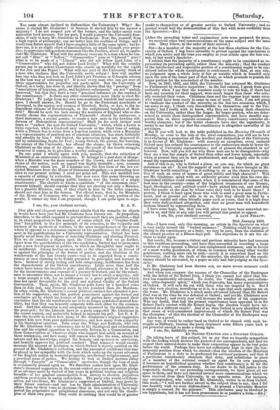26th January 1853. Snt—I have read, only this morning, an
article in the Spectator on what is very justly termed the " Oxford nuisance." Nothing could be more gra- tifying to the constituency as a body, we may be sure, than the abolition of the absurd practice of a fifteen-days poll. The objections to it are too ob- vious to insist upon. But surely, Sir, because a violent and partisan minority have had recourse to this vexatious proceeding and have thus succeeded in recording a large number of votes against a liberal and enlightened statesman, and in favour of a most worths, gentleman, of whom, in common with many other worthy gentlemen, nothing more can be said,—surely it is somewhat hard on the University, that for the fault of the minority, the abolition of the consti- tuency should be advocated, by a paper so able and fair-judging as the Spec- tator.
If Mr. Gladstone had been thrown out, no more severe measure could have been proposed. And when you compare the success of the Chancellor of the Exchequer with the defeat of Sir Robert Peel, I think you cannot but allow that Ox- ford has considerably advanced. No doubt, the " anti-liberal, anti-reform- ing, ultra-dogmatic spirit," which you deprecate, has many representatives at Oxford. It will only die out with those who are inspired by it. But I say this very election, mortifying as it is, is a sign that such opinions are on the wane. Mr. Gladstone is a much more advanced Liberal than Sir Robert Peel was at the time he was defeated at Oxford ; and yet Mr. Gladstone now sits for Oxford; and every year will increase the number of his supporters. Who can doubt, that had the present constituency been appealed to in Sir Robert Peel's contest with Sir Robert Inglis, the election would have ter- minated in a different result? And if so, then Oxford is now identified with that cause of well-considered improvement of which Sir Robert Peel was the champion : of this the election of the Chancellor of the Exchequer may be taken as a proof. Any way, it would be rather bard on Oxford to be classed with such bo- roughs as Sudbury, because the party dominant some fifteen years back is yet powerful enough to make a strong fight. I am, Sir, faithfully yours,
AN OXFORD ELECTOR AND A COUNTRY CURATE.
[In taking leave of this subject, let us say that we heartily sympathize with the feeling which dictates the protest of our correspondents, and that we respect their natural desire to make their corporation appear in its best guise before the world. Perhaps they have not sufficiently kept in view the fun- damental position from which we started—that the election of the Members of Parliament is a duty to be performed for national purposes, and that if a particular constituency obstructs that duty, and substitutes in place of a member of the national council an agent for its own purposes, it becomes an hypothetical question whether that constituency is fit for the performance of the common duty. In our desire to do full justice to the respectable feeling of our protesting correspondents, we have given all our space to them, and have not inserted several more communications which we have received from their University, in an opposite sense. For instance, one correspondent, who voted for Mr. Gladstone, writes to us from Oxford, this week—" I will not further advert to the subject than to say, that I for one heartily wish we were disfranchised. At present a University Member is simply a counsel for the prisoner." This conclusion may be involved in our hypothesis, but it has not been pronounced in so positive a form.--En.]


























 Previous page
Previous page